Why are councils so short of cash when tax is going up?
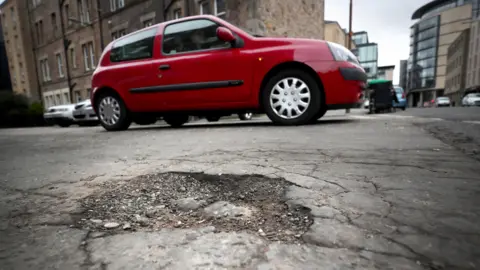 PA Media
PA MediaScotland's councils are facing a budget gap of just under £1bn over the next two years.
But they've just had a real-terms increase to their funding from Holyrood, they've put up local taxes by an average of 9.6%, and many have increased charges for some services while cutting others.
Why are they still so short of cash?
It has become a wearily familiar issue, with prized local services like libraries and nurseries coming under threat because councils are short on cash.
These cuts sting not just because they're core services – many are annoyed because they've just seen a big increase in their council tax.
Do councils have more money?
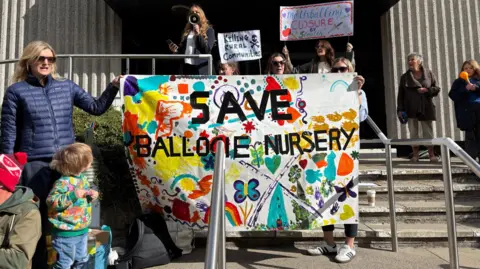
Let's take a look under the hood. First of all, the money coming in.
It's fair to say the amount of money flowing into local government has gone up.
By far the biggest chunk of local budgets comes from Holyrood.
The allocation this year was in excess of £15.2bn, an increase of 6% in real terms.
Councils have also raised more on their own account.
Liberated from the council tax freeze, almost every town hall in Scotland opted for a double digit increase this year. In Falkirk it hit 15.6%, and the smallest was still 6%.
That is forecast to bring in £275m extra over the coming year, across the 32 councils.
The increase was partly making up for the previous year's surprise freeze - overall, bills in Scotland remain lower than in other parts of the UK.
But several councils have already priced in further increases over the next few years.
Many have also increased income from things like council house rents and extra charges for second homes and for collection of garden waste bins.
That can be a real money-spinner in some areas; North Lanarkshire Council expects to raise £1.5m a year after bringing in a charge for garden waste collection.
So why are councils still so stretched? Why are the potholes still often unfilled, and why are some councils at the point of turning off streetlights?
The budget gap
Between the 32 councils, there is currently a gap of £647m between what they intend to spend this year, and how much money they have coming in.
The highest is a £70m gap at City of Edinburgh Council, but it's over £10m at all but six of the councils.
A further shortfall of £528m is projected for 2026/27, and £496m for 2027/28.
In terms of what the costs actually are, the biggest issue is the ever-increasing demand for the services councils provide.
That's most notable in terms of looking after Scotland's aging population, in free personal care and nursing.
Councils plan to spend about £18bn on day to day services this year; £4bn of that is directly related to social care services.
That will only increase as demographic pressure ramp up; people are living longer and the birth rate is falling, so the average age of Scotland's population is rising.
It's estimated there will be an extra 341,300 people over the age of 75 by the year 2047.
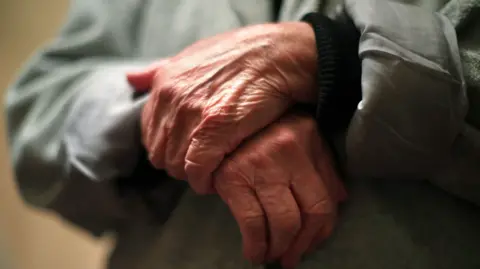 PA Media
PA MediaThere are other pressures too; councils are on the front lines of delivering various government policies, like boosting teacher numbers or providing free school meals.
There is generally cash from the government to deliver that, but it's often ring-fenced - meaning councils have control over less and less of their budgets.
Incidentally that's why cuts often fall in areas like road maintenance, which are fully in the gift of councils to handle.
This has been a long-standing issue - there is no longer any fat to trim. Cost-saving exercises are now cutting into what many would consider core services.
In Aberdeenshire - where the budget gap is approaching £40m, despite a 10% increase to council tax - parents were informed before the Easter holidays that four nurseries were set to be mothballed.
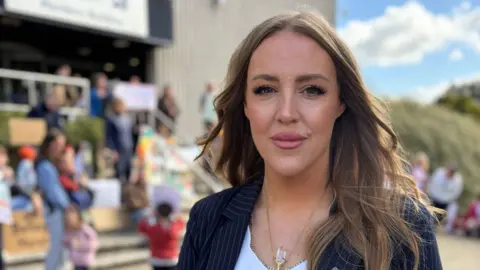
The council says this is a temporary measure, and that there is no intention of a permanent shutdown - but parents protesting outside their headquarters call it "closure by stealth".
Lindsay Love, a parent at Crossroads nursery, told BBC Scotland: "Without those vital local services it can impact really negatively on families.
"Women especially, not having the access to local education close by can cause huge problems getting to work for example."
The role of inflation
Budgets have also been hit by inflation. Everything has got more expensive, and goods and services cost more to deliver.
Castlemilk Youth Complex provides a good example of how funding can be eroded over the longer term even if it holds steady in cash terms.
An ongoing grant from the council provides the bulk of their funding. But it's not indexed to the cost of living or inflation, so it's been eroded in real terms.
The head of the complex, Fraser Howat, says that the funding it gets now is about 20% of what it was in the 1990s - despite the fact the centre is working with even more young people than before.
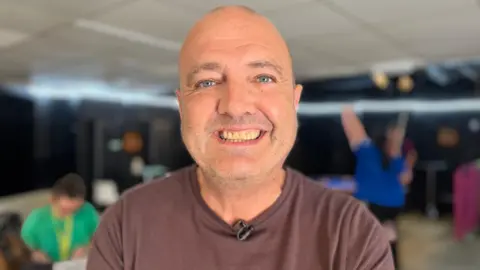
He has already had to let some staff go this year, and says "it's a constant struggle to try and keep the team together and keep this going".
Across the country, inflation has also driven pay deals which councils will have to carry the cost of.
Councils reckon 3% pay settlements are going to continue through to 2027/28, which increases the cost of the workforce year after year.
On top of that, there's the hike in National Insurance Contributions for employers, which hits the public sector too.
Again there's a pot of money for that - the UK government is providing some compensation which then flows on to councils, but there is a major dispute with Scottish ministers who contend the total award doesn't take account of the larger public sector workforce north of the border.
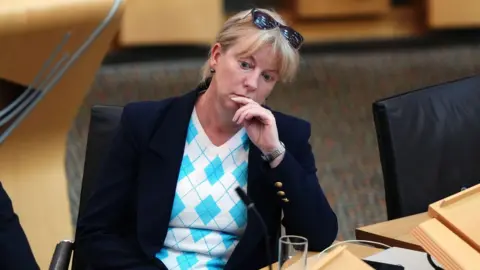 PA Media
PA MediaThe Scottish government has announced £144m of funding for councils to cover the tax increase in NICs, but Cosla estimates the true cost could be more like £370m.
Roll all of this together and you get to why the Accounts Commission concludes that council finances remain "precarious and extremely challenging, and not sustainable in their current form".
We frequently hear calls from these kind of audit bodies about how the delivery of services needs a rethink.
There's also the seemingly endless debate about the future of local taxation, which almost every party wants to reform but have never got around to doing anything about it.
That was one thing during the era of the council tax freeze, but the point the Accounts Commission is making is that increased charges build expectation that services will improve.
Ultimately voters will not put up with paying more to get less.
